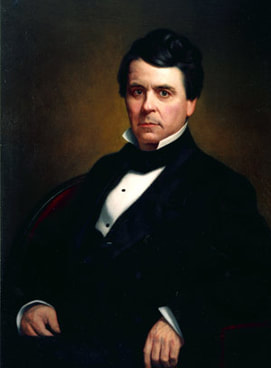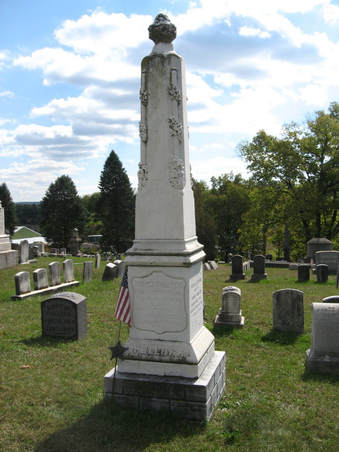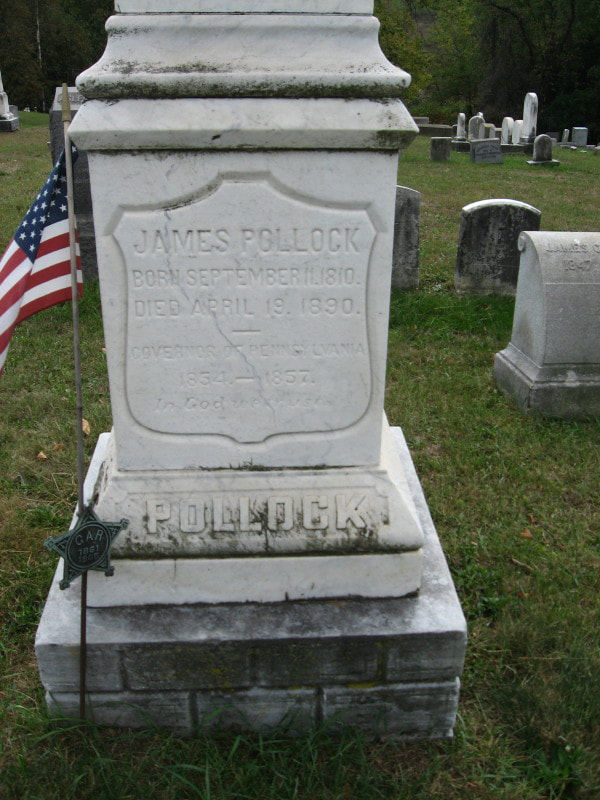 James Pollock James Pollock This James Pollock was not directly related to my line, but I like to bring attention and tell the story of all those who share the same surname and have brought honor and distinction or even shame and disgrace! James was born on September 11, 1810 to William and Sarah Wilson Pollock in Milton, Northumberland County, Pennsylvania. He married Sarah Ann Hepburn and they had 7 children. James died at age 79 on April 19, 1890 in Lock Haven, Clinton County, Pennsylvania and is buried in the Milton Cemetery in Milton. James graduated from the College of New Jersey at Princeton and practiced law in Milton, his home town. He was the district attorney and obtained judicial appointments. In 1844, he was elected to the U.S. House of Representatives and served 3 successive terms, serving from April 5, 1844 - March 3, 1849.. He was a member of the Whig Party and later became a member of the Republican party. During his freshman year in Congress, he boarded in the same boarding house as Abraham Lincoln and developed mutual respect and a longstanding friendship. James supported Samuel Morse, the inventor of the telegraph and was partly responsible for getting Congress to appropriate funds to help build the first line. James was in the room when the first message "What hath God wrought" was received. This moment ushered in the new age of telecommunication. James was the first in Congress to push for the construction of the intercontinental railroad which connected California with the east. In 1848 he gave a speech where he stated: "At the risk of being considered insane, I will venture the prediction that, in less than twenty-five years from this evening, a railroad will be completed and in operation between New York and San Francisco, California." It was completed in 1869 which was 4 years inside the time frame he stated in his speech. After serving in Congress, James was appointed to the Eighth Judicial District president Judge in 1850. During this tenure, the state constitution was amended that required judges submit to public elections, James declined to run. In 1854, the Whig Party nominated James for the governor's race, and was also supported by the Nativist "Know-Nothings" who opposed the Kansas-Nebraska Act. the controversy of his era. While he was governor, Pennsylvania began to sell its publicly held railroads and canals, which was considered to be his most notable milestone. "Governor Pollock also brought about the Normal School Act of 1857, which brought about regional teacher training institutions throughout the Commonwealth, the charter for the Farmer's High School (the institution that would grow into the Pennsylvania State University), creation of a secretary of Common Schools, and purchase of the first governor's mansion at 111 South Second Street in Harrisburg that would be the official home of two governors, Packer and Curtin. Until then, governors rented or purchased their own residences." (1) James helped lead the state through the financial Panic of 1857. He chaired the delegation from Pennsylvania to the Washington Peace Conference of 1861, but the convention failed to prevent the Civil War. Abraham Lincoln appointed James as Director of the Philadelphia Mint in 1861. James was instructed by Salmon P. Chase, Secretary of the Treasury, to prepare suggestions for including "the trust of our people in God" in a motto for America's coins. In his report to Secretary Chase in 1863, he wrote, "We claim to be a Christian nation—why should we not vindicate our character by honoring the God of Nations…Our national coinage should do this. Its legends and devices should declare our trust in God—in Him who is "King of Kings and Lord of Lords." The motto suggested, "God our Trust," is taken from our National Hymn, the Star-Spangled Banner." The sentiment is familiar to every citizen of our country—it has thrilled the hearts and fallen in song from the lips of millions of American Freemen. The time for the introduction of this or a similar motto, is propitious and appropriate. 'Tis an hour of National peril and danger—an hour when man's strength is weakness—when our strength and our nation's strength and salvation, must be in the God of Battles and of Nations. Let us reverently acknowledge his sovereignty, and let our coinage declare our trust in God." James proposed several mottos which included "Our Trust Is In God" and "God Our Trust" Chase revised these into the motto we use today, "In God We Trust". The 1864 2-cent coin was the first to be minted withe this motto. James served as Director of the U.S. Mint from May 1861 to 1866. From 1855 until 1876, James was a trustee of Lafayette College and served as its president from 1863 to his death in 1890. His service to God and country went beyond his service to his state and nation by his service as Vice President of the American Sunday School Union from 1855 to 1890. He co-founded the Sunday Breakfast Rescue Mission, which was a homeless shelter and soup kitchen in 1878 with John B. Stetson (the inventor of the cowboy hat) and John Wanamaker (famous retailer). This shelter has grown to become the leading emergency shelter and largest provider of meals in Philadelphia. Sources: 1.Pennsylvania Historical & Museum Commission; Pennsylvania Governors. URL: http://www.phmc.state.pa.us/portal/communities/governors/1790-1876/james-pollock.html 2. Wikipedia, The Free Encyclopedia; James Pollock URL: https://en.wikipedia.org/wiki/James_Pollock 3. FindAGrave ; James Pollock, URL: https://www.findagrave.com/memorial/10614670
0 Comments
|
AuthorMy name is Vicky, and after researching my family history since 1999, I have found amazing stories that need to be told. I hope you enjoy them as much as I have! Archives
May 2023
Categories |


 RSS Feed
RSS Feed